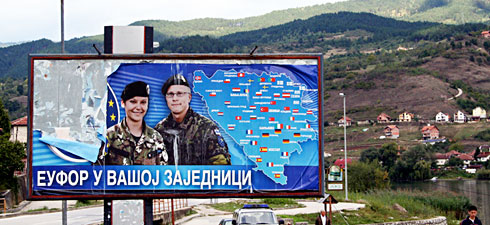Should the summit at NATO's Butmir military base [see box below] be interpreted as yet further proof that America, intends to follow its unblocking of stalled negotiations on Croatian accession to the EU, with a renewed drive to stabilize the region and accelerate the development of closer links between NATO and the EU? Croatia is making strides in its bid to join the EU, and Serbia could soon follow in its footsteps. Sadly, the same is not true for Bosnia-Herzegovina, which simply appears to have wasted the last 14 years. In 1995, the Dayton Agreement brought an end to the war, but since then little has been done to prepare Bosnia-Herzegovina for peace. Washington has no doubt understood that the negotiations that are now underway probably represent the sole remaining opportunity to prevent the disintegration of the country.
The United States and the European Union want to present a united front, and to this end, Washington abandoned its plan to appoint Clifford Bond, the former American ambassador to Bosnia-Herzegovina, to the post of special envoy for the application of constitutional change — which Bosnia needs to implement if it is to present a credible application for membership of the EU — because Brussels opposed his nomination. But the difference in approach is not easy to hide. The head of the Swedish diplomatic service, Carl Bildt, who was the first High Representative of the international community in Bosnia, from 1995 to 1997, takes the view that the Office of the High Representative (OHR) is now obsolete, while the Americans believe that politicians in the country are still unable to work together without the supervision of a foreign governor.
Obama's soft power makes the difference
Although Bosnia-Herzegovina, like all of the western Balkan region is formally under the guardianship of the EU, America still exerts a predominant influence — and without the impetus from the United States, it is hard to imagine that serious reforms will ever be implemented in Bosnia-Herzegovina.
Given complex political geography of the Balkans, the most minor problem can quickly degenerate to the level of serious conflict. You only have to look at how Slovenia's bizarre territorial claim against Croatia — which baffles virtually everyone outside of these two countries — managed to stall the process of European enlargement for a whole year.
Now, America is focusing its drive to prevent the disintegration of the Balkans on Bosnia-Herzegovina, though it may not be able to count on the full cooperation of its Serbian partners, who are critical of its support for Albanian separatism in Kosovo.
Europe, which has a lot to gain from stability in its near neighbours, has proved to be incapable of resolving the conflicts in the Balkans — and its stick and carrot approach has even engendered some unexpected results. The best example of this is the recent move to waive the visa requirement for Serbians which has yet to be extended to the citizens of Bosnia-Herzegovina. This has created an absurd situation, in which the butcher of Srebrenica, Ratko Mladic, can simply present a Serbian passport and enter the EU without a visa, while his Bosnian Muslim victims — who, unlike Bosnian Serbs and Croats, do not benefit from double nationality — have to endure the humiliation of endless queues at European embassies.
This is the reason for the renewed dominance of American influence in the Balkans. But it is important to bear in mind that we are no longer dealing with George Bush's America, which was only too willing to use the language of force to express foreign policy objectives. Today, Barack Obama's "soft power" approach is more oriented towards the European principles of negotiation, cooperation, compromise and consensus. Unfortunately, this is a language that politicians in the Balkans appear unable to understand — and this explains the relatively disappointing progress of the negotiations on the reconstruction of Bosnia in Butmir. If the process is not to remain in deadlock, Bosnia's politicians will have to change their political tune — or they will have to be made to understand that "soft power" does not necessarily mean that force will never be used.
CONTEXT
Ethnic tensions at fever pitch
Meeting on 9 October at the Butmir peacekeeping base close to Sarajevo, under the auspices of the European Union and the United States, the leaders of the Bosniak, Serb and Croat communities of Bosnia-Herzegovina have agreed to negotiate a revised version of the country's constitution by 20 October. However, "ethnic tensions appear as high as any time since the civil war" in 1995, notes theFinancial Times.
"The Bosnian Serb parties continue to reject substantial changes to the constitution based on the 1995 Dayton Peace Agreement," which safeguards the existence of a Serb-led republic that is largely independent of the other political entity in Bosnia-Herzegovina — the Bosniak and Croat federation. Observers are concerned that the failure of negotiations on the constitution could compromise the future existence of the country.
Was this article useful? If so we are delighted!
It is freely available because we believe that the right to free and independent information is essential for democracy. But this right is not guaranteed forever, and independence comes at a cost. We need your support in order to continue publishing independent, multilingual news for all Europeans.
Discover our subscription offers and their exclusive benefits and become a member of our community now!












